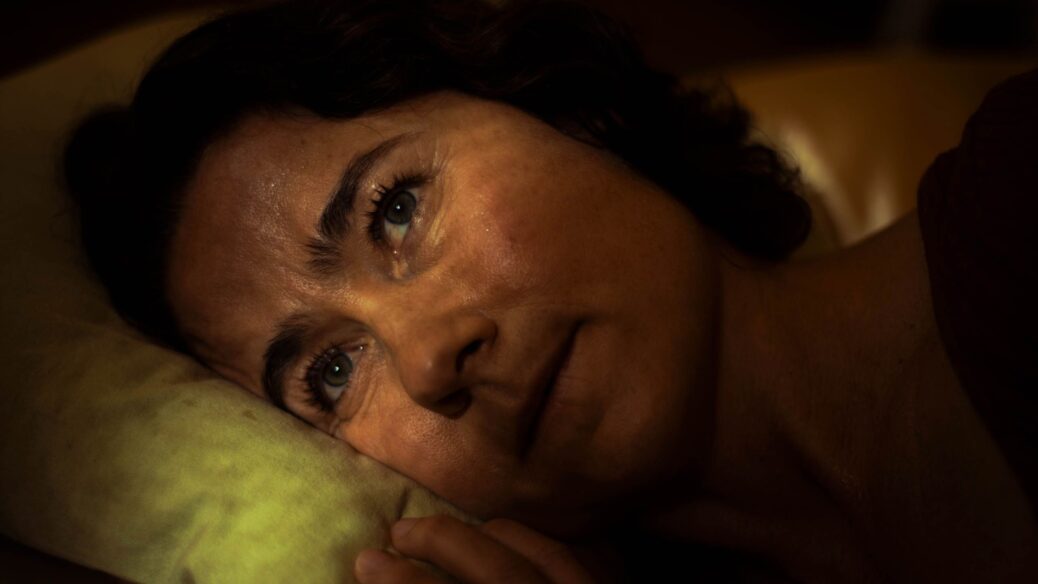This review is part of our Sundance 2021 coverage.
The Pitch: After a traumatic incident involving her girlfriend Judith (Charlotta Åkerblom), Molly (Cecilia Milocco) emerges from a one-year stint in a psychiatric ward, ready to rejoin the world. She moves into a housing development, but almost immediately, her life is disrupted by a strange knocking from the floor above. No one – not super Peter (Krister Kern), not shifty neighbors Kaj (Ville Virtanen) or Per (Albin Grenholm) — believe her. As the knocking persists, Molly’s paranoia increases as her grip on reality decreases. Is the knocking a cry for help or has she lost her mind?
Familiar Territory: Knocking is an adaptation of Swedish novelist Johan Theorin’s text of the same name (his work was previously adapted into 2013’s Echoes From The Dead). His film adaptations have similar concerns, namely a woman who has suffered a loss in the past who becomes embroiled in a mystery in the present with characters who may not have her best interests at heart. There is also an overlap with the film’s screenwriter Emma Broström, whose previous film, Flocken (2015) involves a woman who reports a crime, but is not believed by the members of her community.
It’s ironic, then, that despite featuring similar characters and themes, Knocking’s biggest fault is its story and script. Molly’s struggle to acclimatize to her new environment in the face of a nagging, persistent (possibly otherworldly) event offers a compelling hook, but mid-way through the film, it becomes evident that the narrative has stalled out. What began as uncomfortable encounters with standoffish neighbors and disbelieving police officers becomes rote repetition in between Molly’s periods of self-imposed, paranoid isolation in her apartment.
The static nature of the storytelling ultimately strands Milocco in the equivalent of a one-woman, single-location play, staring at vents, writing on walls and losing all track of time. Despite clocking in at a scant 70 minutes, Knocking runs out of steam before puttering to a simple and not-entirely satisfying climax.
Strong Vision: Despite its too-simplistic narrative, Knocking is filled with exciting visual flourishes courtesy of first-time feature director Frida Kempff. In spite of the bland aesthetic of the apartment complex, Kempff and her creative team use camera movement, framing and lighting to keep Knocking from becoming a cramped parlor piece. Beyond the requisite high angle camera shots of Molly staring up at the ceiling, there are also frequent dutch angles to connote that everything is not alright.
In one standout sequence, an agitated Molly rushes out of her apartment, runs upstairs and confronts her male neighbors. Kempff attaches a Steadicam to Milocco’s body so that the audience experiences every herky-jerky motion, our attention focused exclusively on Molly’s face and unable to see what’s happening around her unless she turns. It’s a disorienting and kinetic moment that really reinforces how emotionally raw and paranoid Molly has become by this point of the narrative.
Body and Face: Knocking’s other strength is Milocco herself. The actress gives an extremely effective performance, perfectly balanced between a kind of innocent naivety and rage and frustration. As the audience surrogate to these strange events, Milocco’s performance is front and center: she’s in nearly every shot of the film. Her performance is shaped, in part, by her expressive her facial features, which Kempff frequently frames in close-up as Molly processes what’s happening.
The performance is also helped by a subtle (and clever) shift from bright/living to artificial/sterile. Early in the film, Molly seeks out fruit, plants and sunshine – sweet, warm living elements – to liven up her palate and living quarters after the drab and dreary ward. As the film progresses and Molly’s mental state deteriorates, however, these warm elements are replaced by cold, red, artificial indoor lighting and drawn shades and Molly appears to give up eating entirely.
Eye Spy A Twist: While the narrative ultimately peters out and the resolution doesn’t entirely satisfy, there is admittedly an undeniable pleasure in questioning whether Molly is actually losing her mind or if the knocking, moaning, and cries for help are real. Though Broström’s script eventually runs out of permutations to keep the debate interesting, there are a number of tantalizing moments and sequences.
One particularly memorable bit is when Molly, still adjusting to the size, scope, and proximity of her many new neighbors, stares out the window at the apartment building directly across. At several different points, she sees herself – or a figure that bears a striking resemblance to her – in another unit who may or may not plan to harm themselves. It’s an appropriate visual motif that reinforces the film’s themes about being unable to trust your senses and instincts.
Editors’ Picks
The Verdict: Knocking is an uneven film. Despite strong direction by Kempff in her feature debut and a daring, go-for-broke performance by lead actress Milocco, there’s just not enough weight in these hollow knocks and the payoff doesn’t feel earned or substantial enough.









Recent Comments